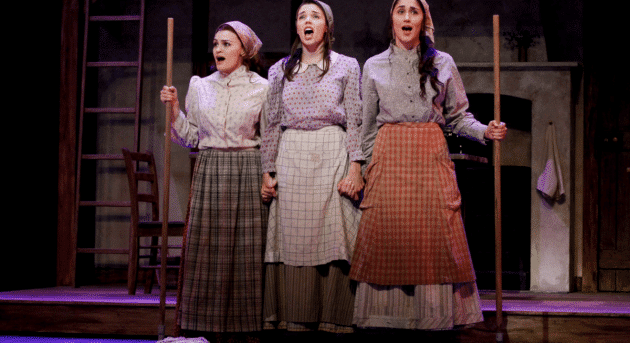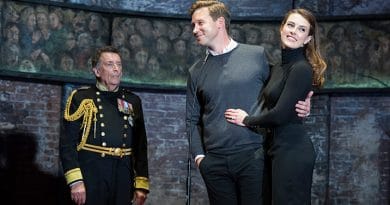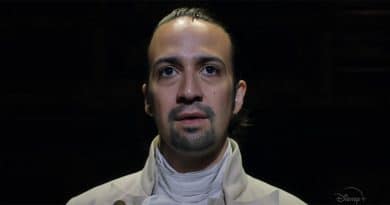Review: Fiddler on the Roof – Capitol Theatre, Sydney
Fiddler opened on Broadway in 1964, the same year as Funny Girl, Hello Dolly! and Man of La Mancha. It was an exciting time in musical theatre history, where stories were starting to become more cohesive, with meaningful plots and ambitious storylines.
With a swelling, high-stakes and lovely score by Jerry Bock, and deceptively simple lyrics by Sheldon Harnick, the book (by Joseph Stein) follows loosely the story of Tevye the Dairyman by Sholem Aleichem.
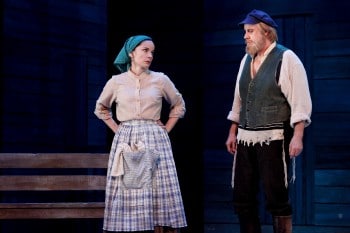
Roger Hodgman’s Fiddler on the Roof, now playing at Sydney’s Capitol Theatre, is a thoughtful and faithful staging of a great classic.
Set in Russia in 1905, Tevye lives with his wife and five daughters in Anatevka. Their humble village lives are shaken first by a breaking of tradition – when Tevye’s daughters decide to marry for love, rather than waiting for an arranged match – and later by the creeping influence of the Tsar and his crushing pogroms.
This is not really a production full of surprises – the stage by (Richard Roberts) is traditional Fiddler fare, evoking Chagall with its disappearing buildings and endless sky, and the choreography (reproduced by Dana Jolly) is Jerome Robbins’ original work, though the famous ‘bottle dance’ feels tentative.
The biggest draw is Anthony Warlow’s towering performance as Tevye. Warlow is one of the best in the world and his Tevye is ferociously loving, gruffly endearing and – in the second act, crucially, when his contemplative nature is overrided by anger – devastating. He also gets the biggest, fondest laughs of the night as he drinks with butcher Lazer Wolf (Mark Mitchell).
Warlow’s voice is a perfect match for this near indomitable score; he carries the show with confidence and astonishing vocal control. Monica Swayne as his daughter Hodel is another standout, and in her song “Far From The Home I Love,” she creates a small but so tender moment of real skill. Also sounding fine is Blake Bowden’s Perchick, who also turns in a solid performance as the radical youth.
In some moments and with the above exceptions the cast and orchestra both don’t feel quite up to the challenge of the score. Sigrid Thornton’s Golde isn’t a triumph of singing but she’s plenty charming, and Lior’s Motel, the shy tailor’s son, is a gentle and likeable figure.
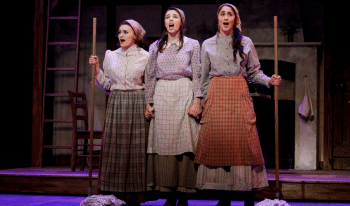
Fiddler on the Roof is almost always playing somewhere in the world, but it’s on Broadway again now, helmed by master revivalist Bart Sher. I saw the production last year and there’s a chilling urgency in it. By making some small directorial changes, the fear and terror as the life of Tevye’s family is turned upside is palpable – the production brings high stakes back to the production, and it feels vital, vibrant and incredibly sad.
It’s encouraging to see Australia’s latest Fiddler too and know that while Hodgman’s production doesn’t necessarily dwell on the persecution of the show’s Jewish characters, or on their final, chilling, refugee status, he doesn’t ignore or short-change it, either. Even though this production is quite by-the-book, these more troubling subjects are sadly all too relevant now, as scores of refugees seek uncertain futures globally. It’s too difficult to romanticise Anatevka’s exodus as a noble indignity to be borne with chins up and shoulders straight anymore; we are too cruel to refugees in this country every day to let that thread of story slip.
Musicals can comment on the world almost on the sly – using the direct and emotional vessel of music to create in audience members a swell of sympathy for the plight of others they perhaps may not have grasped without it.
In that frame of mind, maybe Fiddler is the exact musical we need touring Australia right now. Maybe it will encourage sympathy, inspire action, and help us see reform to deeply disturbing and cruel national policies regarding the treatment of refugees, people who have already been persecuted enough for following the traditions of their families and religion as they try to navigate changing times and worlds.

